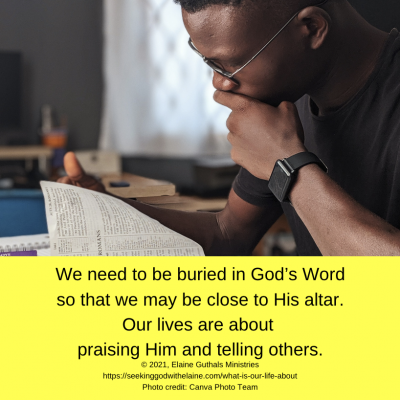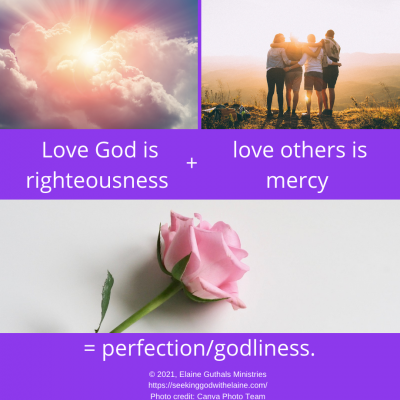Solomon ended his Book of Ecclesiastes when he concluded the meaning of life. This daily devotional looks at our purpose in life.
Nuggets
- Teachers must be diligent in presenting God’s Word; readers must be diligent in studying it and making needed changes in their lives.
- Our purpose is to have a relationship with God.
Devotions in The Meaning of Life series

We’ve been going through Ecclesiastes for six weeks now in our Sunday Morning Bible Study devotions. This is the last in The Meaning of Life series.
For the next quarter, we will be looking at Philippians, Colossians, and Philemon. We will be looking at Joy in the Gospel.
But we have to finish up with Solomon and Ecclesiastes first. Solomon switched from telling us about his search for the meaning of life to talking about who he was. Let’s take a look.
Let's Put It into Context
Here is a running list of what we’ve discussed previously.
A Life of Study
“In addition to the Teacher being a wise man, he constantly taught the people knowledge; he weighed, explored, and arranged many proverbs. The Teacher sought to find delightful sayings and write words of truth accurately. The sayings of the wise are like cattle prods, and those from masters of collections are like firmly embedded nails. The sayings are given by one Shepherd” (Ecc. 12: 9-11 CSB)
Teachers must be conscientious in presenting God’s Word; readers must be conscientious in studying it and making needed changes in their lives.
Solomon knew that if his readers just read through his work, that was good. What would be better was if they would read his work, find God, and be changed by it.
Emmons put it this way. He wrote, “Every wise preacher knows that unless he impresses the minds of his hearers, he can do them no good by his preaching. Hearers must feel what they hear, or what they hear will be like sounding brass, or a tinkling cymbal.
Resource
That tells us what we must do. I must write, not only in a way that makes you want to read what I have written, but also in a way that challenges you. My goal should be to get you to think about what God is telling you through these devotions.
Your responsibility in this is to study what I am saying. Is it right? (I am not going to get everything right because we cannot fully understand God.)
How does it compare with what you believe? Did it solidify what you believe, or did it wreck it? Or was it somewhere in between?
That means you must study and meditate in what God is wanting you to hear. Then you must make the necessary changes in your lives.
Don’t worry. I have to do that, too. No, it isn’t easy for me, either.
The creative part in writing the devotions take up most of the day. The techie stuff in getting them to the website and broadcasting them takes most of the night.
It is hard to sit down and say, “What is God actually telling me?”
But God doesn’t want us to go through the motions. It isn’t about religion. It isn’t about checking things off our list.
We’ve got to grow our relationships with God. This is all about becoming more like Him.
No, we’re not going to get it all right, but we need to try to do so. We are talking God’s truth. Whenever we witness or try to make disciples, we need to make sure we are giving the most accurate picture of Him.
We know that the words that will do the most good to change us to be like God will be those that hurt the most. We can’t just sugarcoat everything so we up our numbers.
That won’t do those we witness to and disciple any good. “Not everyone who says to me, ‘Lord, Lord,’ will enter the kingdom of heaven, but only the one who does the will of my Father in heaven” (Mt. 7: 21 CSB).
We need to be buried in God’s Word so that we may be close to His altar. Our lives are about praising Him and telling others.

A Life of Purpose
“But beyond these, my son, be warned: there is no end to the making of many books, and much study wearies the body. When all has been heard, the conclusion of the matter is this: fear God and keep his commands, because this is for all humanity. For God will bring every act to judgment, including every hidden thing, whether good or evil” (Ecc. 12: 12-14 CSB)
Our purpose is to have a relationship with God.
We must guard against reading — and watching — things that do not follow God’s purpose for our lives. Satan can use books, television, films, and the internet to pull us away from God. We need to keep watch that he doesn’t succeed.
Walters wrote that our purpose in life is “… to see that we get into right relationship with God.” It isn’t about the job we do. It isn’t about the friends we make.
Resource
Our purpose in life is about being right with God. It is about following God’s laws and commandments. It is about worshiping Him.

Johnson said that we look at our lives and see that it didn’t turn out how we planned. It reminds me of a line in Plumb’s Need You Now.
“Standing on a road I didn’t plan Wondering how I got to where I am”
Related Links
Plumb
God is in control of our lives. We must remember that He is working out everything that happens for our good (Rom. 8: 28).
Johnson pointed out that Solomon was sympathetic with people who found themselves on an unplanned road. It is easy for us to exclaim in those times, “‘Absolute futility,’ says the Teacher. ‘Everything is futile’” (Ecc. 12: 8 CSB).
Resource
Thompson reminded us that that exclamation is a worldview point of view. Disciples know this life is worth living because it prepares us for our life in eternity.
Resource
Glossary
Solomon found in his searching that the purpose of life is to fear God — “… fear God and keep his commands …” (Ecc. 12: 13 CSB). The Old Testament’s fear of the Lord meant we approach God in awe, reverence and love, not terror.
Glossary
Hastings expanded on that. He wrote, “This is the fear of God, not such a dread as wicked men have, and which makes them tremble — like the devils in their prison beneath, but a holy and reverential sense of His majesty — a belief in His presence, power, and goodness — the adoration of His love and wisdom — the reliance upon His providence and the dread of His displeasure.”
Resource
There is no doubt in Solomon’s mind. There aren’t any mitigating circumstances.
We not only have to fear God, but we also must keep his laws and commandments. To me, that means we must have heart knowledge, not just head knowledge.
Hasting also brought up that the fear of the Lord must contain an element of worship in it. It boils down to we must believe enough in Him to submit to Him.
Cowell reminded what keep God’s commandments entailed.
- Repent.
- Believe.
- Greatest commandment.
- “To walk in ‘all the statutes of the Lord.’”
Resource
Notice, when it says greatest commandment, commandment isn’t plural. Salvation is not contingent on “… ‘You shall love your neighbor as yourself’” There is no other commandment greater than these.’” (Mk. 12: 30 ESV).
Glossary
Notice that it is plural when it says we are to obey all statutes. We can’t pick and choose in which laws and commandments we don’t believe. It is all or nothing.
This is the only way to God. He is adamant that we must come to salvation His way. Believing in Jesus means we are confident in our hearts that Jesus offered His life on the cross so that His blood would pay the penalty for our sins.
To read a related devotion, click the button below.
We know that the two greatest commandments are a simplification of all the others. “All the Law and the Prophets hang on these two commandments” (Mt. 22: 40 NIV).
We can’t, though, just look at those two commandments, say we keep them, and break all the others. Breaking any of the other laws and commandments breaks the greatest commandment.

We’ve got to try to imitate God. We’ve talked before about the New Testament word for fear of the Lord is godliness.
In our How Can We Live Godly Lives? series that we are doing for our Redo for Godliness, we’ve been talking about meditation. Buckley wrote, “This [the whole duty of man] suggests as a theme for meditation the fact that the religion revealed by God includes the entire sphere of possible human activity; that there is nothing good that a man can think, do, or say, or feel, which cannot in its highest forms be shown to be rooted in, and a fruit of, the religion which God has revealed.”
Resource
We need to meditate on everything we think, do, say, or feel — everything. Our whole lives have to be given over to God.
We know there will be a judgment day.
To read a related devotion, click on the appropriate button below.
We want to find meaning in our life because our relationship with God is where it needs to be.

Making the Connections
For me, in reading Ecclesiastes, it was difficult to determine where Solomon fell with his beliefs. Johnson brought up something important. He wrote, “Never does the author of this book speak of religion as if it were an illusion, or of God as if He were other than true. The spiritual part by which we are related to God and know God is our genuine self.”
Resource
Solomon knew God was real. He knew He was the one for whom we should be searching.
How Do We Apply This?
How is sure we have the fear of the Lord is through worshiping Him and keeping His commandments. If we don’t change our character to be like His, then we really aren’t following Him.
- Read to learn, not read to read.
- Take things into our hearts and minds.
- Watch what we read and listen to so that is it promotes the Godview, not the worldview.
- Evaluate what we read and hear to ensure it is following what the Scriptures really say.
- Revere God because He created us and is Sovereign God.
- Fear God when we disobey Him — we don’t want to offend God.
Resource
It is important that we find that the meaning of life rests solely with a relationship with God. That will help us gain salvation and will help us in our redo for godliness. It all centers on God.
Father God. We praise Your name. We thank You that You love us and have chosen us. We commit to keep all Your laws and commandments. The meaning of life is to have a solid relationship with You. That is what we want. Amen.
What do you think?
Leave me a comment below (about this or anything else) or head over to my Facebook group for some interactive discussion.
If you don’t understand something and would like further clarification, please contact me.
If you have not signed up for the email daily or weekly providing the link to the devotions and the newsletter, do so below.
If God has used this devotion to speak with you, consider sharing it on social media.